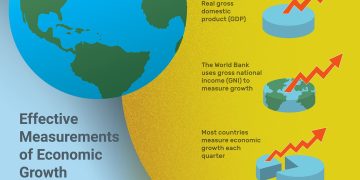Introduction
- Setting the Stage:
- The United States has long been considered the leader of the global economy, with its economic power, technological innovation, military strength, and financial influence shaping international trade, finance, and diplomacy.
- However, in recent years, the global economic landscape has shifted. The rise of China as an economic superpower, ongoing geopolitical tensions, technological advancements, and global challenges like climate change have created a more multipolar world.
- This article will explore whether the U.S. can maintain its economic leadership in a changing global context, considering internal challenges, external competitors, and the evolving dynamics of international cooperation and competition.
Section 1: The U.S. as the Global Economic Leader – Historical Context
- Post-World War II Economic Leadership:
- The U.S. emerged from World War II as the world’s undisputed economic leader. With a booming industrial economy, the Bretton Woods system, and the establishment of international institutions like the IMF and World Bank, the U.S. played a key role in shaping the post-war global order.
- The U.S. dollar became the global reserve currency, further cementing America’s position as the central hub of global finance.
- The American Model of Capitalism:
- The U.S. has long promoted free-market capitalism as a model for economic success. With innovation, entrepreneurship, and a dynamic labor market, the American economy was seen as a beacon of prosperity and opportunity.
- Key sectors like technology, finance, manufacturing, and agriculture solidified the U.S.’s position as a global economic powerhouse.
- Geopolitical Influence and Soft Power:
- The U.S. also leveraged its military power, diplomatic reach, and cultural influence through Hollywood, universities, and other soft power tools to shape global narratives and establish itself as a leader in both economic and political affairs.
Section 2: The Shifting Global Economic Landscape
- The Rise of China:
- In recent decades, China has emerged as the U.S.’s primary economic challenger. Its rapid industrialization, expanding technological capabilities, and growing geopolitical influence have disrupted the traditional global economic order.
- China’s Belt and Road Initiative, its role in global supply chains, and its increasing influence in international institutions have placed it in direct competition with the U.S.
- The Decline of U.S. Manufacturing and Economic Shifts:
- Over the past several decades, the U.S. has experienced the offshoring of manufacturing jobs, particularly to China and other emerging economies, leading to concerns about deindustrialization and a hollowed-out middle class.
- While the U.S. remains a leader in technology, finance, and services, its position in traditional manufacturing has diminished, which may have implications for its future competitiveness on the global stage.
- Technological Competition and Innovation:
- Technological innovation has been one of the U.S.’s greatest economic assets, but competition in fields like artificial intelligence, biotechnology, and 5G technology is intensifying. Countries like China, South Korea, and the European Union are investing heavily in technology, raising the stakes in this crucial sector.
- Multipolarity and the Decline of Unilateralism:
- The world is increasingly characterized by a shift toward multipolarity, where the influence of the U.S. is being balanced by rising powers such as China, the European Union, India, and regional players like Japan and Brazil.
- The decline of unilateralism, particularly in the wake of the Trump administration’s “America First” policy, has contributed to global uncertainty, making it harder for the U.S. to maintain its historical dominance.
Section 3: Challenges to U.S. Economic Leadership
- Political Polarization and Domestic Challenges:
- The growing political polarization in the U.S. has created challenges for long-term policy stability. Frequent changes in leadership, along with debates over economic policies such as healthcare, taxes, and social welfare, create uncertainty for businesses and investors.
- Domestic challenges such as rising inequality, stagnant wages, and the erosion of the social safety net contribute to growing dissatisfaction among segments of the population, potentially undermining the economic stability required for global leadership.
- Debt and Fiscal Imbalances:
- The U.S. government’s national debt has soared in recent years, raising concerns about long-term fiscal health. The fiscal imbalance, driven by military spending, entitlement programs, and tax cuts, poses risks to the U.S.’s financial stability.
- With the U.S. dollar as the global reserve currency, the national debt’s sustainability is critical not just for the U.S. but for global markets. Growing debt levels could lead to inflation, higher borrowing costs, and reduced investor confidence in the U.S. economy.
- The Impact of Global Crises:
- Global crises, such as the COVID-19 pandemic, climate change, and geopolitical tensions, have had significant economic repercussions. The pandemic, in particular, exposed vulnerabilities in global supply chains, workforce dynamics, and healthcare systems.
- The U.S. economy was severely impacted by the pandemic, and while recovery is underway, the economic consequences may persist for years, affecting the country’s position on the global stage.
- Climate Change and Sustainability:
- Climate change is emerging as a key factor influencing global economic dynamics. The U.S. faces both the challenge of mitigating the environmental impacts of its economy and transitioning to a more sustainable model.
- The economic cost of natural disasters, shifting agricultural patterns, and the transition to green energy could strain the U.S.’s global economic leadership unless it successfully navigates the green transition.

Section 4: The Role of the U.S. in the Global Economy Moving Forward
- Strengthening Global Partnerships and Alliances:
- To maintain its global leadership, the U.S. must engage more actively with its allies and partners, including the European Union, Japan, Canada, and others. Strengthening economic, trade, and security alliances can help the U.S. counterbalance the influence of China and other rising powers.
- International cooperation is especially important in areas such as climate change, public health, trade, and technological development, where global challenges require multilateral solutions.
- Investment in Education, Infrastructure, and Technology:
- To remain competitive, the U.S. must invest in its workforce, infrastructure, and innovation ecosystem. This includes prioritizing STEM education, improving broadband access, upgrading infrastructure, and supporting research and development.
- The U.S. needs to foster an environment where emerging industries like clean energy, quantum computing, and biotechnology can thrive. Strong investment in these sectors can help the U.S. regain its competitive edge.
- Reforming the U.S. Tax and Immigration Systems:
- Economic leadership requires a tax system that encourages innovation, investment, and competitiveness. Reforming the tax code to promote business growth, while addressing income inequality, can boost economic vitality.
- Immigration reform is also key. The U.S. benefits from a diverse and highly skilled workforce, and ensuring that it remains an attractive destination for talent from around the world will help sustain its global economic leadership.
- Revitalizing American Manufacturing:
- The U.S. must focus on revitalizing its manufacturing sector by investing in advanced technologies like automation, robotics, and AI. This can create jobs, enhance competitiveness, and reduce reliance on foreign imports.
- Trade policies should be reevaluated to strike a balance between protecting domestic industries and maintaining healthy international trade relations.
Section 5: Conclusion – Can the U.S. Sustain Its Global Economic Leadership?
- Recap of Challenges and Opportunities:
- The U.S. faces significant challenges to maintaining its global economic leadership, including political polarization, rising debt, competition from China, and global crises. However, there are also significant opportunities for the U.S. to reinvent itself through investment in education, infrastructure, green energy, and international cooperation.
- Balancing Global Competition with Cooperation:
- The U.S. must embrace a more collaborative approach to global leadership, balancing competition with cooperation on issues like trade, technology, and climate change. By working with other global powers, the U.S. can maintain its economic influence while navigating the increasingly complex geopolitical landscape.
- Final Thoughts:
- While the U.S. faces numerous challenges, it still possesses many strengths that can help it maintain its leadership role in the global economy. By addressing its internal issues, embracing innovation, and strengthening international partnerships, the U.S. can continue to be a major economic force in the shifting global order.



































